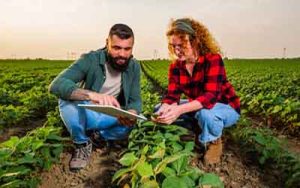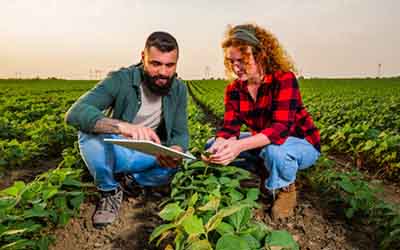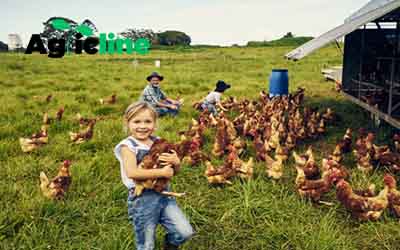Choosing a career in farming today is vastly different from a few decades ago. With the advent of sustainable practices, technological advancements, and a growing emphasis on organic and locally sourced food, agriculture has evolved into a complex, rewarding field.
This transformation means that the path to becoming a farmer is no longer just about inheriting family land or learning through trial and error.
Instead, it involves a blend of traditional knowledge, hands-on experience, and formal education.
For aspiring farmers, understanding what educational background is needed can be the stepping stone to a successful career in agriculture.
Whether you dream of running a small organic farm, managing vast agricultural lands, the right education can equip you with the necessary skills and knowledge.
The Core Knowledge and Skills for Farmers
- Agricultural Science
A deep understanding of plant and animal biology is essential. Knowing how crops grow, what nutrients they need, and how to manage pests sustainably forms the backbone of successful farming.
- Technology and Mechanization
From precision farming to the use of drones for crop monitoring, technology plays a significant role in modern agriculture. Familiarity with these tools can enhance efficiency and yields.
- Sustainable Practices
With a growing emphasis on sustainability, farmers need to master conservation techniques, organic farming methods, and water management to ensure their farming practices are environmentally friendly.
- Business Management
Farming is also a business. Skills in financial management, marketing, and planning are vital for running a successful farm.

What education is needed to become a farmer?
- Formal Education vs. Hands-On Experience
- Post-Secondary Education Options
- Bachelor’s Degrees
- Technical and Vocational Schools
- Certifications and Short Courses
- Online Courses and Resources for Continuous Learning
- Hands-On Training and Apprenticeships
- Advanced Education and Specializations
- Lifelong Learning and Community Involvement
Formal Education vs. Hands-On Experience
While traditional educational pathways provide the theoretical knowledge needed in agriculture, hands-on experience offers invaluable insights that cannot be learned in a classroom.
The combination of formal education and practical experience prepares aspiring farmers to tackle the challenges of modern agriculture effectively.
- Formal Education
Through courses and programs, students can learn about agricultural science, business management, and emerging technologies in farming. This foundation is crucial for understanding the complexities of the field.
- Hands-On Experience
Internships, apprenticeships, and working directly on farms provide practical skills and real-world insights.
This experience is invaluable for understanding the day-to-day operations and nuances of farming.
High School Preparation
For many aspiring farmers, the journey begins in high school. This foundational stage offers various opportunities to gain both knowledge and practical experience in agriculture.
High school students interested in a farming career can take advantage of specialized programs, extracurricular activities, and other resources designed to introduce them to the field of agriculture.
Many high schools offer agricultural education programs that provide a comprehensive overview of the field.
These programs often include courses in plant and animal sciences, agricultural mechanics, agribusiness management, and environmental science.
Through these courses, students can gain a solid foundation in the principles of agriculture, preparing them for further education or entry-level positions in the industry.
Volunteering and Internship Opportunities on Farms
High school students can also seek out volunteering and internship opportunities on local farms.
These experiences provide a hands-on understanding of farming operations and techniques, allowing students to apply what they’ve learned in the classroom to real-world situations.
Engaging in agricultural activities during high school not only builds a solid foundation of knowledge and skills but also helps students determine their specific interests within the field of agriculture.
Post-Secondary Education Options
After high school, aspiring farmers have several paths to further their education and specialize in their areas of interest within agriculture.
From community colleges offering associate degrees to universities with comprehensive bachelor’s programs, and technical schools focusing on practical skills, there’s a wide range of educational opportunities tailored to the diverse needs of the agricultural sector.
Associate’s Degrees in Agriculture
Community colleges play a crucial role in agricultural education, providing accessible, hands-on programs that cover the basics of farming, animal husbandry, agribusiness, and agricultural technology.
An associate degree typically takes two years to complete and can serve as a stepping stone to a bachelor’s degree or directly into a career in agriculture.
Programs often include internships or cooperative work experiences, offering students valuable real-world experience.
Bachelor’s Degrees
For those looking to go deeper into the science, technology, and management aspects of agriculture, pursuing a bachelor’s degree from a university with a strong agricultural department is an excellent choice.
These four-year programs offer specialized tracks in areas such as agronomy, horticulture, animal science, agricultural economics, and sustainable agriculture.
A bachelor’s degree not only provides a comprehensive education in agricultural principles but also opens the door to higher-level positions and further academic pursuits.
Technical and Vocational Schools
Technical and vocational schools offer focused programs that equip students with practical skills in specific areas of agriculture, such as farm equipment operation, organic farming practices, and livestock management.
These programs are designed to prepare students for immediate entry into the workforce with the skills employers are looking for.
Certificates and diplomas from these institutions can significantly enhance employability and career prospects in the agricultural sector.
Certifications and Short Courses
For those interested in specific aspects of farming, such as organic or sustainable agriculture, certifications, and short courses can provide targeted knowledge and skills.
These programs, often offered by agricultural extension services, online platforms, and professional organizations, allow individuals to specialize further and stay updated with the latest practices and technologies in the field.
Online Courses and Resources for Continuous Learning
The field of agriculture is constantly evolving, with new technologies and practices emerging regularly. Online courses and resources offer flexibility and accessibility for ongoing education.
Platforms like Coursera, edX, and specific agricultural education websites provide courses on a wide range of topics, from precision agriculture to farm management, allowing individuals to continue learning and adapting throughout their careers.
Hands-On Training and Apprenticeships
While formal education lays a strong foundation in agricultural principles and practices, hands-on training and apprenticeships are invaluable for gaining the practical experience necessary to manage a successful farm.
Importance of Practical Experience in Farming
Practical experience in farming is essential for understanding the realities of agricultural work.
It allows aspiring farmers to apply theoretical knowledge to real-world situations, from daily farm operations to solving complex problems related to crop production, livestock management, and resource conservation.
Hands-on training also develops essential skills such as machinery operation, time management, and decision-making under unpredictable circumstances.
Finding Apprenticeships and Hands-On Training Programs
Apprenticeships and hands-on training programs offer structured opportunities for learning by doing, under the guidance of seasoned farmers and agricultural educators.
These programs can be found through:
- Agricultural Extension Services: Extension programs often have connections with local farms and can provide information on apprenticeship opportunities.
- Agricultural Associations and Organizations: Many agricultural organizations offer or can recommend apprenticeship programs focused on specific farming practices or sectors.
- Farming Conferences and Workshops: Attending industry events is a great way to network with farmers and learn about training opportunities.
- Online Agricultural Communities: Websites and forums dedicated to farming can be valuable resources for finding apprenticeship listings and advice on getting started.
Learning from Experienced Farmers and Agricultural Professionals
Apprenticeships provide a unique opportunity to learn from those who have spent years in the field.
Experienced farmers can offer insights into the nuances of farming that are often not covered in academic settings.
This mentorship can cover everything from technical skills and innovative farming techniques to business management and market strategies.
Furthermore, working alongside professionals helps build a network within the agricultural community, which can be crucial for career development and future opportunities.
Advanced Education and Specializations
For those aspiring to reach the pinnacle of agricultural knowledge or to specialize in a particular area of farming, advanced education offers a pathway to achieving these goals.
Master’s and Ph.D. programs in agricultural sciences, as well as further specializations, can prepare individuals for leadership roles in research, education, policy, and the innovation of farming practices.
Master’s and Ph.D. Programs in Agricultural Sciences
- Master’s Programs
These typically two-year programs allow students to focus on a specific area of interest within agriculture, such as agribusiness, agricultural engineering, soil science, plant pathology, or animal science.
A master’s degree can enhance one’s expertise in a specialized field, leading to opportunities in research, higher education teaching, or advanced positions in the agricultural industry.
- Ph.D. Programs
For those interested in academic research or seeking to drive innovation in agricultural practices and policies, pursuing a Ph.D. is the next step.
Doctoral programs involve deep research in a particular area of agriculture, contributing new knowledge to the field and potentially leading to breakthroughs in farming techniques, sustainability, and food security.
Lifelong Learning and Community Involvement
The agricultural sector’s dynamic nature requires farmers and agricultural professionals to engage in continuous learning and active community participation.
Staying updated with the latest advancements, adopting new technologies, and being part of a supportive community are essential for personal growth and the sustainable development of the farming industry.
The Importance of Staying Updated with New Agricultural Methods and Technologies
Agriculture is a field that benefits significantly from innovation, with new methods, technologies, and practices emerging regularly.
Lifelong learning ensures that farmers and agricultural professionals can adapt to changes, improve their operations, and increase productivity and sustainability. This can involve:
- Regularly attending workshops, webinars, and seminars.
- Subscribing to agricultural journals and newsletters.
- Participating in online courses and training programs.
Attending Workshops, Seminars, and Conferences
Workshops, seminars, and conferences are invaluable for learning about the latest research, technologies, and trends in agriculture.
These events offer opportunities for networking with peers, experts, and industry leaders, fostering collaborations that can lead to innovation and improvement in farming practices.
Building Your Farming Career
Embarking on a career in farming is both a challenging and rewarding journey. It requires a blend of education, practical experience, continuous learning, and community involvement.
- Combining Education and Experience for a Successful Farming Career
The foundation of a successful farming career is the combination of formal education and hands-on experience.
Education provides the theoretical knowledge necessary for understanding the complexities of modern agriculture, while practical experience allows for the application of this knowledge in real-world scenarios.
Aspiring farmers should strive to balance these aspects, seeking internships, apprenticeships, and employment opportunities that complement their educational background.
- Networking and Mentorship in the Farming Community
Building a strong network within the farming community can significantly impact your career. Networking provides access to advice, support, and opportunities that might not be available otherwise. Mentorship, in particular, can be invaluable.
Experienced mentors can offer guidance, share insights from their own careers, and help navigate the challenges of starting and managing a farming operation.
Engaging with local farming groups, attending agricultural conferences, and participating in online forums are excellent ways to build these connections.

My final thought on What education is needed to become a farmer
The path to becoming a farmer is as diverse as the agricultural sector itself. From high school programs and post-secondary education to hands-on training and advanced degrees, each step provides valuable knowledge and skills that contribute to a successful farming career.
Embracing lifelong learning and community involvement further enriches this journey, enabling aspiring farmers to stay at the forefront of agricultural innovation and sustainability.
I encourage you to pursue your passion for farming with an open mind and a commitment to continuous improvement, paving the way for a fulfilling and impactful career in agriculture.
Recommendations
5 Top Farm Management Software
How to get a loan to start a cattle farm
How to start a small farm with animals
How to become a farmer with no experience



